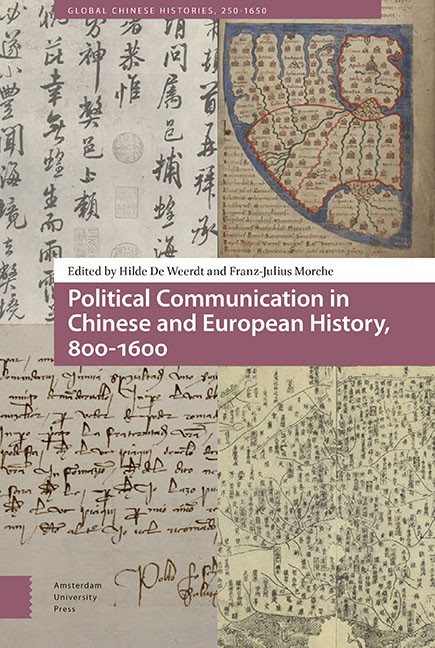Book contents
- Frontmatter
- Dedication
- Contents
- List of Figures and Tables by Chapter
- Acknowledgments
- Introduction
- Part I Communication and the Formation of Polities
- Part II Letters and Political Languages
- Part III Communication and Political Authority
- Part IV Memory and Political Imaginaries
- Epilogues
- List of Contributors
- Index
Introduction
Published online by Cambridge University Press: 17 June 2021
- Frontmatter
- Dedication
- Contents
- List of Figures and Tables by Chapter
- Acknowledgments
- Introduction
- Part I Communication and the Formation of Polities
- Part II Letters and Political Languages
- Part III Communication and Political Authority
- Part IV Memory and Political Imaginaries
- Epilogues
- List of Contributors
- Index
Summary
In this collection of essays, we examine the significance of political communication in the comparative study of medieval polities. The workshop out of which this collection grew was initially intended to work towards an explanation of the divergent courses that Chinese and European history have taken in the second millennium through extended conversations about the role of political communication in the formation, maintenance, or fragmentation of empires and other kinds of polities. We abandoned the paradigm of Sino-European divergence in favour of a more open-ended investigation of the significance of communication processes and the politics of mediators and communicators in the histories of medieval Chinese and European polities. In the introduction we outline the analytical benefits of and the historiographical need for the micro- or meso-historical comparative case studies included in this volume. We first turn to the question of why and how historians have turned to political communication. Then we discuss the questions of why and how the authors employed comparative approaches. Lastly, we will also underscore the need for comparative histories of medieval polities, those included in this volume as well as those that are not.
Political Communication
Two factors in particular motivated the focus on political communication, which we broadly define as ‘the circulation of information and ideas concerning political institutions and events’1 or ‘the exchange of political knowledge and values among both state- and non-state actors’ (De Weerdt and Watts, Chapter 1).
First, twentieth-century literatures on the comparative history of empires and state formation tend to focus on state institutions, social organization, and ideologies which are typically understood as well-defined traditions with fixed characteristics (texts, rituals, and values whose meanings remain constant over time). In this literature, political communication appears irrelevant; ideological or cultural factors are reduced to broad cultural orientations that are more or less automatically shared by ruling elites and the governed. In his seminal macro-sociological study, The Political Systems of Empires (1963), Shmuel N. Eisenstadt, for example, sees the cultural orientations of imperial elites as the primary reason for successive Chinese regimes’ ability to accommodate change within pre-established political frameworks.
- Type
- Chapter
- Information
- Publisher: Amsterdam University PressPrint publication year: 2021

